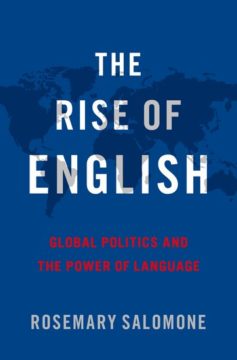Stan Carey in Sentence first:
 For much of the previous millennium, a pidgin language was used around the Mediterranean for trading, diplomatic, and military purposes. Based originally on Italian and Occitano-Romance languages, it had indirect ties to the Germanic Franks and thus gained the term lingua franca.
For much of the previous millennium, a pidgin language was used around the Mediterranean for trading, diplomatic, and military purposes. Based originally on Italian and Occitano-Romance languages, it had indirect ties to the Germanic Franks and thus gained the term lingua franca.
Nowadays that phrase tends to be applied to Latin or English. Latin’s time as the default international language of learning ended long ago; English’s status as a lingua franca is still broader but very much in flux – and politically fraught, simultaneously uniting and dividing the world.
Tackling this topic is a new book, The Rise of English: Global Politics and the Power of Language, by Rosemary Salomone, a linguist and law professor in New York. Her impressive book (sent to me by OUP for review) does much to clarify the forces behind English’s position as a lingua franca and what the future might hold.
Having a lingua franca brings great benefits for travel, business, politics, and research: witness the speed at which Covid-19 vaccines were developed through international scientific collaboration. But English’s primacy rests on centuries of violence and exploitation. The power dynamics have shifted but remain unbalanced and entangled with complex threads of post-colonial identity.
More here.
